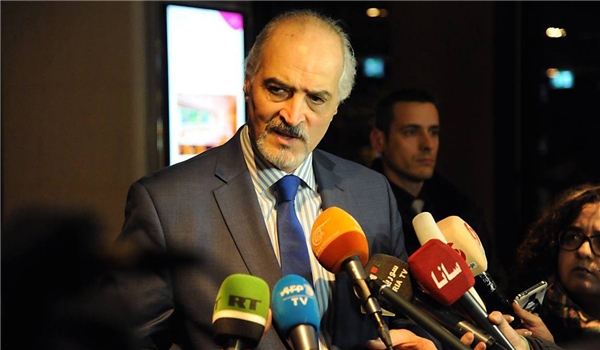

“The stance of the Turkish delegation was negative since the beginning of the Astana track. This negativity was translated into the modest results we listened to just now,” Ja’afari underscored.
“I am saying that because the Turkish delegation objected to the adoption of any document related to the implementation of mechanisms of the agreement on the de-escalation zones,” he pointed out.
“I say ‘modest’ because we came to Astana and the agenda of the fifth round was specifically to conclude the details of the agreement over the de-escalation zones, and the mechanisms of implementing the agreement over the four de-escalation zones.”
“The Turkish side opposed this and practiced a policy of blackmail against this subject, which is the main subject of the agenda, and also against other documents that the parties intended to adopt.”
“This is why I cannot say but that the Turkish delegation, unfortunately, for the fifth time sought with all their might to hinder reaching positive results that could practically serve the interests of the Syrian people.”
“Contrary to the positive standpoint taken by all the parties except by the Turkish delegation, there has been an indication that the Turkish policy towards the Astana process has been a negative policy” noting that the Turkish delegation objected to the adoption of documents on the implementation of mechanisms for the agreement of de-escalation zones.”
The fifth round of talks between the Syrian government and opposition started in Kazakhstan’s capital on Tuesday, with Iran, Russia, and Turkey present at this round of talks as mediators. Jordan and the United States also participated as observers.
Iran, Russia and Turkey agreed to resume the next round of Syrian peace talks in Astana in late August following their decision to continue discussions on creating four de-escalation zones in Syria.
“(It has been) decided to hold the next high-level international meeting on Syria in Astana in the last week of August 2017,” the three mediators of the peace talks said in a joint statement on Wednesday.
Prior to the next round, the joint working group of the three countries will meet in Iran on August 1-2 to continue delineation of de-escalation zones, the communique added.
The statement further underlined the need for efforts to secure the stability and territorial integrity of Syria, noting that there can be no military solution to the crisis.
Russia, Iran and Turkey agreed on May 4 to set up four de-escalation zones in Syria.
Under a memorandum signed at the talks in Kazakhstan’s capital of Astana, these four zones include the Idlib Province and some areas in the neighboring provinces of Aleppo, Lattakia and Hama, an area North of Homs, the Damascus suburb of Eastern Ghouta, and a couple of provinces in Southern Syria, Dara’a and Quneitra.
In those areas, outlawing combat operations, along with the establishment of a no-fly zone for military aircraft, were set as of May 6.
The memorandum was concluded for six months and can be extended automatically.







